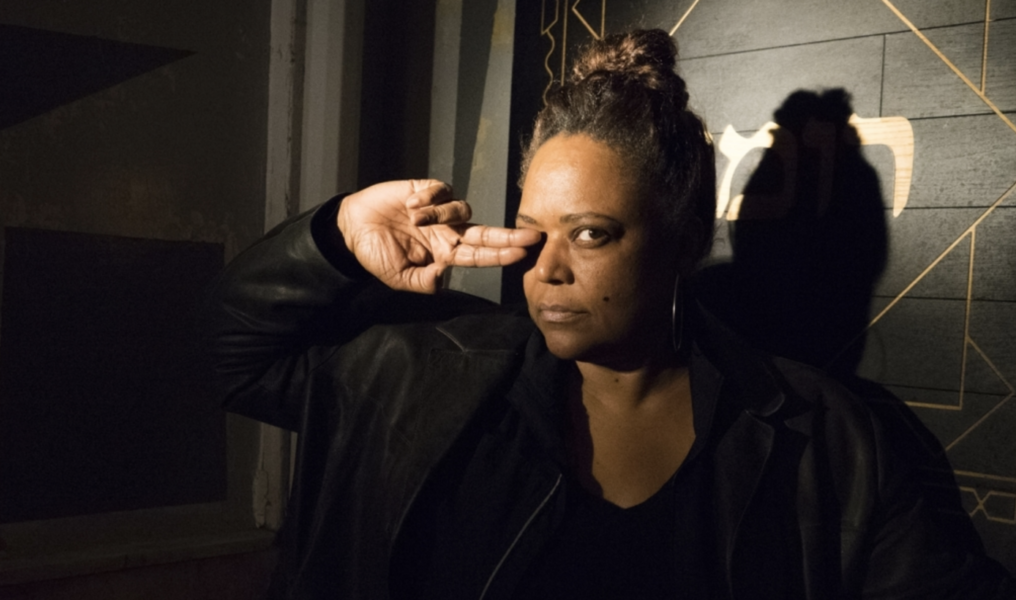The best Detroit techno artists produce the kind of music that practically demands the audience to get up and move. DJ Kelli Hand (K-Hand for short) had it down to a science.
"First of all, she was a damn good DJ," recalls Adriel Thornton, Detroit music and event producer who was also friends with the renowned DJ. "That you can't really minimize. Her ability to move me with sound was great. She was super sweet, but she was meticulous about her craft."
The Detroit techno community is reeling from the sudden loss of 56-year-old DJ K-Hand, "The First Lady of Detroit Techno," who died on Wednesday, Aug. 4. Her personal life is something of a mystery, but there's no question that as a Black woman techno artist she started blazing a trail in a cis male-dominated field decades ago.
"We're talking about the early '90s, and it was really male-dominated," says Thornton. "She was doing just as good as any male counterpart, and that was really important."
K-Hand leaves behind her record label company, Acacia Records, and a legacy that influenced and inspired many, especially within the LGBTQ+ community.
But beyond her queer legacy, she was revolutionary in a transformative musical era, as techno was created during a decline and transitional period in the city of Detroit in the 1980s. Lack of resources and jobs, tremendous debt and the impacts of the crack era had left the city in decay.
Then, boom.
Techno hit Detroit with a fusion of synthesized sounds, charged beats and electronic interludes. It brought energy and a new era of music to Detroit. When techno took off, so did K-Hand. Traveling back and forth, she was heavily involved in the New York and Detroit club scenes.
"I had been coming to New York for a while," recalls K-Hand in an interview with Mixmag. "It was almost like I lived there. That was actually my first era — just coming to New York and getting a taste of the city and the clubs surrounding it. Paradise Garage was always the number one."
Paradise Garage played host to a pivotal LGBTQ+ NYC club scene from the late '70s through the late '80s. "I can say … the sound in the club, in the club itself, nobody else has reproduced that sound," she says in the interview.
In New York, the queer community embraced techno's marginalized history, loud style and 12-hour sets and turned it into an artform. Techno music was, and still is, a part of the queer experience. Fortunately, K-Hand was in New York during the '80s, honing her own style of this Detroit-born genre.
The queer community inspired burgeoning techno club scenes like Paradise Garage all over the country. The bright lights and big sounds of early techno clubs permeated countless new safe spaces for the LGBTQ+ community.
The electronic music transformation didn't stop in the '80s. Queer nightlife, influenced by the techno movement, birthed the club scene we see today. It explored creativity in a raw light, through body movement, voice and, most recognized, costume.
Today, techno and the LGBTQ+ community go hand in hand, and artists like DJ K-Hand were transformational in forging this connection.
"She was involved in a lot of [projects]," says Thornton. "I was a part of DEMF (Detroit Electronic Music Festival), and it was in the third year that Kelli was part of the music festival. She helped pick the lineup that year."
K-Hand's legacy continues to shine through the community she left behind, as seen through the outpouring of support on social media.
"A key figure and friend who pushed her own unique Detroit sound through an industry for over 30+ years," tweeted longtime Detroit DJ Richie Hawkins. "Condolences to her family and I know we will all remember Kelli through her incredible music contributions."
Sad to hear the Kelli Hand passed away. A key figure and friend who pushed her own unique Detroit sound through an industry for over 30+ years. Condolences to her family and I know we will all remember Kelli though her incredible music contributions. pic.twitter.com/rF9GbIBXGG
— richiehawtin (@richiehawtin) August 4, 2021
View K-Hand's legendary Boiler Room set below.










